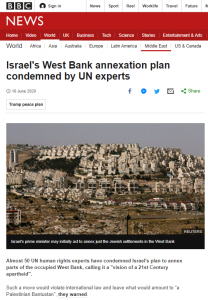Back in June we noted that a BBC report headlined ‘Israel’s West Bank annexation plan condemned by UN experts’ informed readers that:
“…President Trump’s plan for peace between Israel and the Palestinians allows for Israel to “incorporate” the settlements – a radical shift from previous US positions.”
The same statement appeared in a BBC backgrounder titled ‘Explainer: Israel, annexation and the West Bank’.
As noted here at the time:
“That latter claim is of course inaccurate and misleading; the Clinton Parameters of 2000 proposed that “Israel would retain settlement blocs containing 80 percent of the settler population”.
As noted in a paper published by BICOM:
“Clinton believed that: “The borders should be drawn that result in Israel retaining the settlements blocs close to the border whilst ensuring contiguity of a Palestinian state” adding that: “The line should strike a balance between minimising the amount of land annexed and the number of Palestinians affected.” One principle that guided Clinton was that 80 per cent of the settlement population would not have needed to leave their homes.
The Bush administration also believed some settlement blocs should remain part of Israel. A letter from Bush to then Prime Minister Ariel Sharon in April 2004 stated that: “In light of new realities on the ground, including already existing major Israeli population centres, it is unrealistic to expect that the outcome of final status negotiations will be a full and complete return to the armistice lines of 1949”.”
CAMERA UK submitted a complaint to the BBC concerning the misrepresentation of “previous US positions” in those two articles, pointing out that previous US administrations also proposed leaving the majority of Israeli residents in Judea & Samaria in place, under Israeli rule.
On July 7th we received a response informing us that it would take more time to address our complaint and on July 28th the BBC informed us that “we’ve not been able to reply to your complaint within the time period we aim for” due to “a higher than normal number of cases”.
On August 19th we received the following communication:
“Thank you for getting in touch about our articles Explainer: Israel, annexation and the West Bank and Israel’s West Bank annexation plan condemned by UN experts and please accept our apologies for the long and regrettable delay in our response.
While we understand the point you are making, the difference is that this is a published US peace plan which involves retaining 100% of the settlements, whereas previously US proposals at most spoke about the right of Israel to retain large settlement blocs.
This was also in the context of Israel-Palestinian direct talks, the outcome of which depended on those two parties themselves, whereas this plan allows for the incorporation of all the settlements by Israel as a fait accompli – something no previous US administration has done.
After considering the point further we have amended both paragraphs to now say:
However, Donald Trump’s Israeli-Palestinian peace plan, unveiled in January, allows for Israel to “incorporate” all the settlements – something no previous US administration had countenanced.
We consider this a clarification, which does not warrant a note on the story.”
As we see, the BBC claims that the ‘Peace to Prosperity’ proposal “allows for the incorporation of all the settlements by Israel as a fait accompli – something no previous US administration has done”.
In fact the document – in which the word ‘vision’ is repeatedly used to describe the US proposals and which includes maps described as “conceptual” – clearly states that:
“The peace agreement that will hopefully be negotiated on the basis of this Vision should be implemented through legally binding contracts and agreements (the “ISRAELI-PALESTINIAN PEACE AGREEMENT”).” [emphasis added]
Section 22 of the document is titled ‘Conduct during negotiations’ and it opens with the words “We hope that the parties [Israel and the Palestinians] will seize the opportunity, embrace this vision and begin negotiations” before going on to outline expectations from the parties “during the peace negotiations”.
That is clearly not consistent with a ‘fait accompli’ (i.e. something that has already happened or been done and cannot be changed) as claimed by the BBC and hence one can but wonder if BBC staff have actually read the document concerned.
Nevertheless, this very belated amendment to the two BBC articles at least means that those accessing online material which the BBC describes as ‘permanent public record’ will no longer be misled on the issue of “previous US positions”.
Related Articles:





